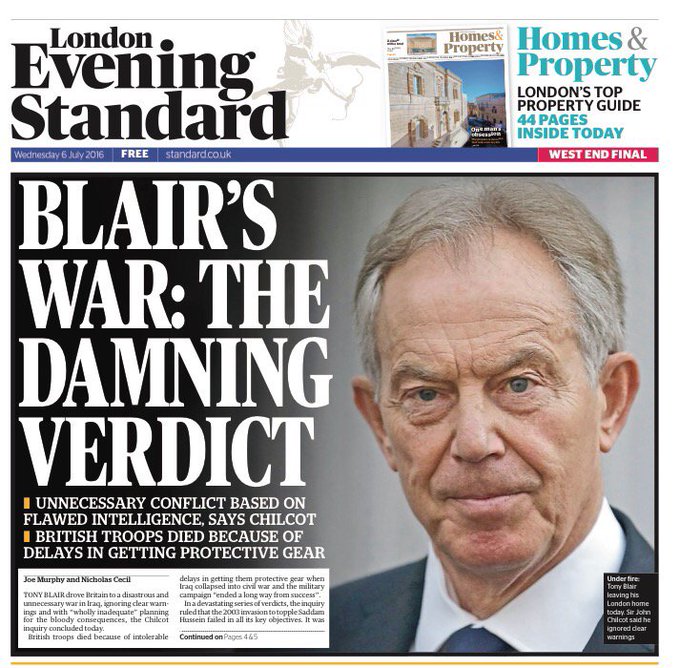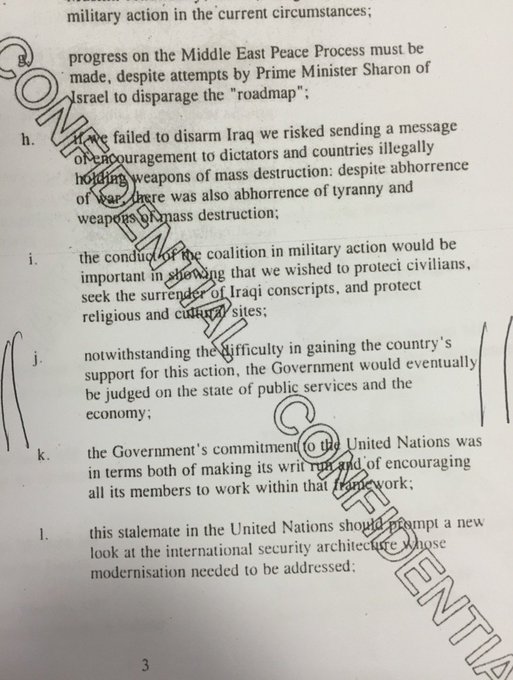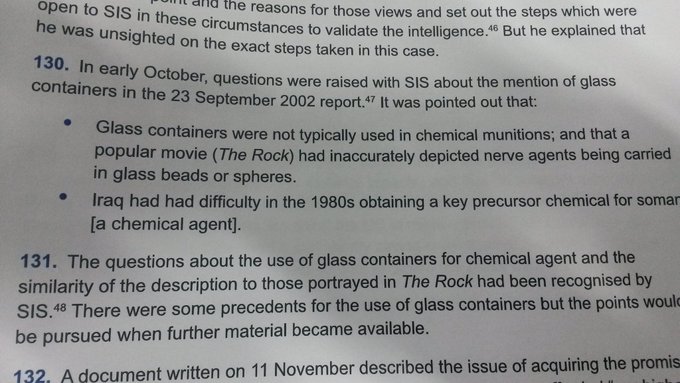In pictures: Chilcot report released
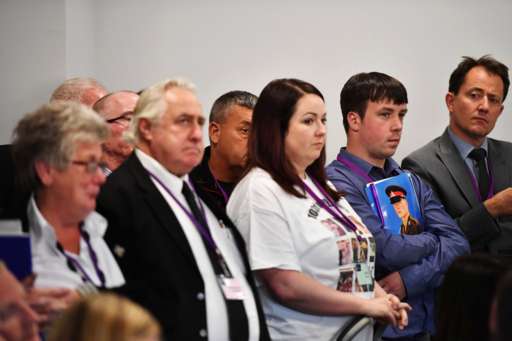
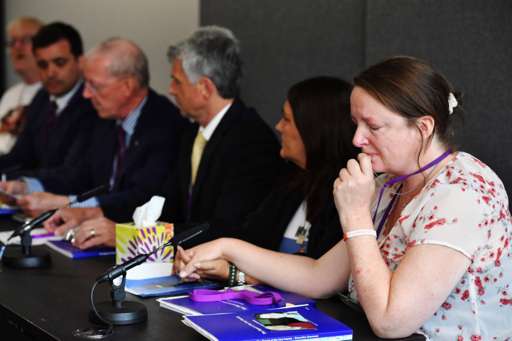
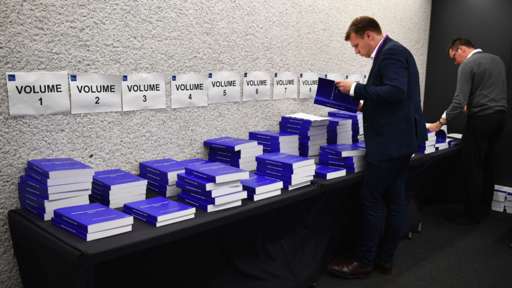
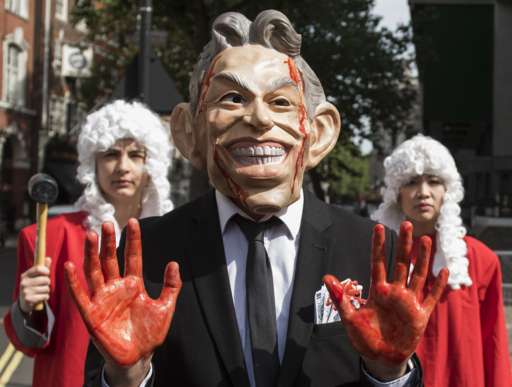
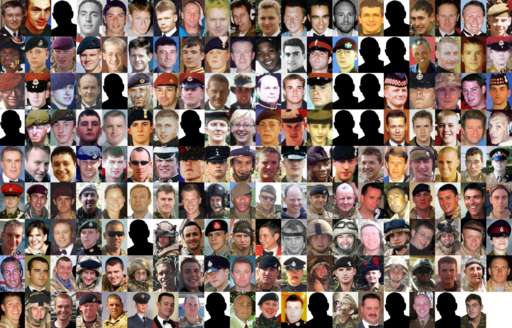
‘Iraq and Middle East will stabilise’ – Blair
During his press conference, Tony Blair said the decision to invade Iraq ultimately contributed to the struggle for political change across the Middle East:
Let’s be clear about this decision. It cut with the grain of what’s happening across the Middle East. And I believe by the way that Iraq will stabilise and the Middle East will stabilise. Because my analysis of what’s going on in the Middle East is that it is one big struggle – to get rid of sectarian religious politics, and replace it with pluralistic, tolerant, religiously tolerant politics.
And it’s about the desire for rule-based economies and not corrupt economies. Now I think those are two things people are struggling for all over the Middle East. Iraq under Saddam had no chance.”
‘I did not mislead this country’ – Blair
Former PM Tony Blair makes a passionate statement during his press conference to address the Chilcot report into the Iraq War.
‘Damning verdict’ – Evening Standard
Stuart Hughes, BBC senior world affairs producer tweets:
Government ‘will be judged on public services’
Norman Smith, BBC News assistant political editor, tweets:
Watch: Sir John Chilcot – WMD intelligence was ‘flawed’
‘I want Blair to admit he was wrong’
There were 19 Scottish service personnel who died during the Iraq campaign following the invasion.
Diane Douglas, from Aberdeen, is the mother of Lance Corporal Allan Douglas, 22, who was shot in January 2006.
She told the Evening Express newspaper that the hole her son had left “will never be filled”.
We didn’t get proper closure. I think about him every day and think of things I want to say to him every day. That hole will never be filled. I want to see justice done for the lives that were lost. I want him [Tony Blair] to admit that it was illegal for a start and to admit that he did wrong. I would hope to see something come out of it, I would like parents to get compensation.”
Tony Blair finishes speaking
Tony Blair has finally finished speaking, an hour and 50 minutes after he first began his statement about the Chilcot report on the invasion of Iraq.
History ‘will take different view’
Mr Blair says he still believes “history will take a different view” on the Iraq War.
“I hope in the end, and I believe in the end, Iraq will stabilise, and the Middle East will stabilise… My analysis of the Middle East is that it is one big struggle to get rid of sectarian politics and replace it with pluralistic religiously-tolerant politics…
“Iraq under Saddam had no chance, Iraq today has a chance.”
Some people in the West say it would have been better to leave the dictators in power but they are forgetting there was no stability in Iraq if you were Kurdish or Shia, he says.
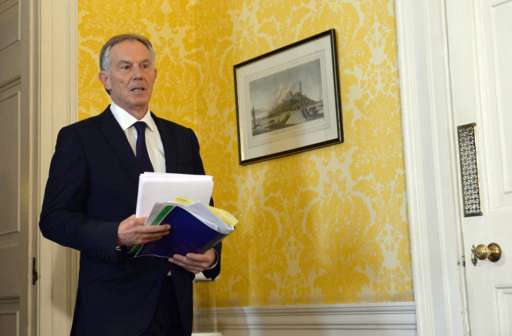
‘There’s a melancholy aspect to all this’ – former US official

Tara McKelvey
BBC News, Washington
“There’s a melancholy aspect to all this,” said Daniel Benjamin, a former state department counter-terrorism coordinator under the Obama administration. “Tony Blair was one of the UK’s finest prime ministers, but I guess he put too much priority on maintaining a close relationship with the US – and not enough on maintaining independent judgement.”
“The Chilcot report confirms most Americans’ understanding of what went wrong and suggests the British government – like their own – didn’t do due diligence. The Bush administration was determined to go to war. For the British government, it’s much the same.”
“It adds another level of confirmation of what we already know about the Bush administration’s rush to war and the shoddy job that was done in evaluating the true situation in Iraq. It’s more of an exercise to assess culpability.”
Blair being questioned by journalists
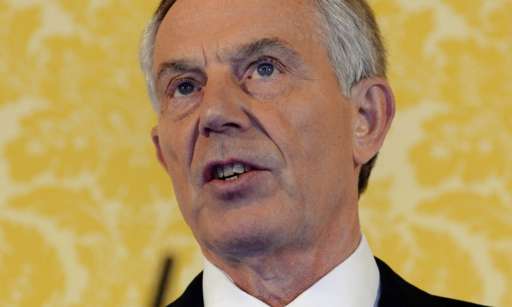
Mr Blair has been speaking for more than an hour. He is still taking questions from journalists, having said he would answer as many questions as they wanted to ask.
He has reiterated many of the points he already made within his statement.
To recap:
- “The intelligence was wrong. I express more sorrow, regret and apology than you may ever know”
- “Please stop saying I was lying, or I had some dishonest or underhand motives”
- “I cannot accept that troops died or were injured in Iraq did so in vain”
- “I believe I made the right decision and the world is better without Saddam Hussein.”
- “It’s my belief if we learn the right lessons, the next generation will see peace in the Middle East”
Blair ‘sorry for loss of life’ during Iraq War
“I acted both in good faith and genuinely believed the intelligence I was given,” Mr Blair says.
He adds: “I say to right-minded people ‘Go and read the reports and tell me you wouldn’t have made the decisions I made’.”
He makes the point again that he believes there is “no inconsistency in saying I’m sorry for the loss of life but not being sorry for the decision I made”.
‘No safer today than we were’ – Blair
More from Tony Blair on the decisions he made prior to the Iraq War:
I had the motives I explained and the reason I can’t depart from the decision is I look at what’s happening in the world today, and I’m afraid do not believe that we are safer today than we were back then.”
‘Please stop saying I was lying’ – Blair
During his press conference, Tony Blair was asked for his response to calls that there should be some kind of consequences for him personally:
That’s up to them to call for what they want. But what I’ve tried to do today is explain why I acted as I did. And, you know, in the end what more can I do than say to people ‘This is why I took the decision I did and if you disagree with me, fine, but please stop saying I was lying or, you know, I had some sort of dishonest or underhand motive’.”
Account to tweet whole Chilcot report
Buzzfeed UK’s editorial developer Chris Applegate has created an account that will be tweeting out every single word of Sir John Chilcot’s report.
He says it may take some time for all of the tweets to be sent, however.
At the time of this update, just 37 of those tweets had been sent. The first was:
British troops ‘did not die in vain’
Mr Blair says he cannot accept criticism that British troops were not fighting for a cause in Iraq.
Service personnel did not die in vain, he adds.
“They were fighting the forces of extremism we see in the world today,” he says.
Blair ‘relishing opportunity to explain himself’
Former prime minister Tony Blair has been speaking for well over an hour now.
He has seemed emotional at times, and animated and passionate at others, as BBC diplomatic correspondent Paul Adams’ tweet – and these pictures – suggest.
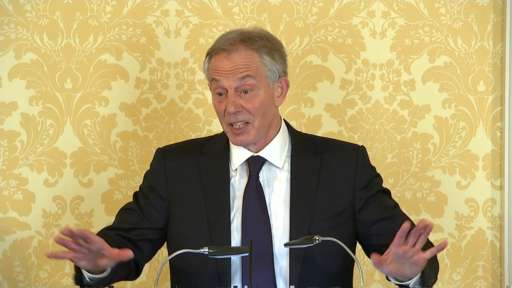
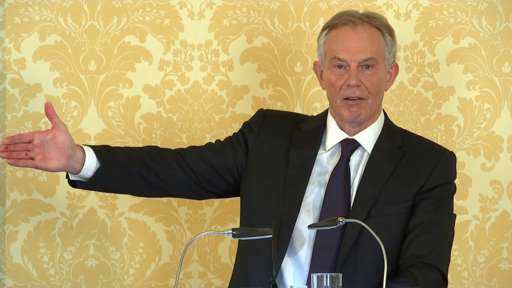
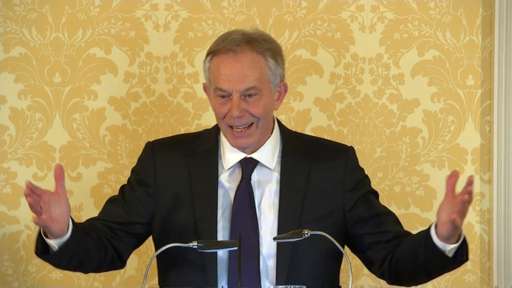
SIS source ‘based intelligence on Hollywood movie’
David Blair, chief foreign correspondent for the Daily Telegraph, tweets:
‘No underhand motives’
Mr Blair acknowledges the decision to go to war “obviously overshadows everything people think about me”.
“Please stop saying I was lying or had some kind of dishonest or underhand motive,” he adds.
Report does not discuss alternative outcomes, Blair says
Mr Blair says he apologies for mistakes in planning but the “fundamental problem is people want me to apologise for making that decision and I can’t do that”.
He emphasises several times that the report does not cover what could have happened if Saddam Hussein had not been removed.
Chilcot report ‘crystal clear, polite – but damning’

Laura Kuenssberg
BBC political editor
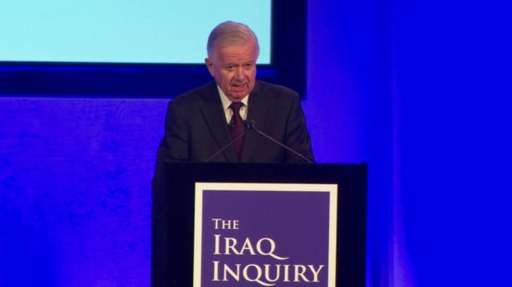
It has taken longer than anyone expected.
But the conclusions, reached with the weight of more than two million words, backed with evidence from thousands upon thousands of documents, are crystal clear, polite – but no doubt, completely damning – even if perhaps no real surprise.
There will be weeks of searching through the evidence that’s been published for the first time today, so these first reflections may be reshaped in the days to come. But in these first hours, Sir John Chilcot’s judgements seem careful, but bold and precise.
Middle East peace is possible, Blair says
Responding to questions from journalists, Mr Blair says passionately while gesticulating with his arms that some people talk “as if I don’t care about the loss of life”.
But he says: “I had to decide are more people going to suffer, are more people going to die if we leave this dictator in power.”
Extremism is “scourge of our time”
Mr Blair says: “The real threat is Islamist extremism and its ideology,” adding that it must be confronted with “a combination of hard and soft power.”
He adds that extremism is “the scourge of our time” and that the UK needs to urgently put in a strategy to tackle it and an honest debate about the UK’s role.
Blair: Not be a day in my life when I don’t relive decision
Mr Blair says he will take questions after his statement.
In concluding, he acknowledges that many people will find it impossible to reconcile his decision.
“I hope future leaders can learn from mistakes I made… There will not be a day in my life when I don’t relive and rethink what had happened.”
Tessa Jowell: ‘No war plan with Bush’
Former Labour cabinet minister Tessa Jowell has said there was no “war plan” with then US president George W Bush and “no deception of the cabinet” in the run-up to the Iraq War.
She said the Chilcot report showed there was no “falsification of intelligence”, that “the attorney general’s advice was in place and the cabinet wasn’t misled”.
She said she hoped the publication of Sir John’s report gave “some comfort to the families who lost people they loved” but said it showed: “Not an illegal war, no deception of the cabinet and no question of there being a war plan with George Bush.”
Blair on delaying action
Mr Blair addresses the suggestion in the report that military action might have been necessary later.
He argues that if the coalition had withdrawn the threat of action in 2003 it would have found it almost impossible to regroup its forces, and Saddam Hussein would have been in a strengthened position.
“Even if you disagreed with removing Sadaam in 2003, you should be thankful we are not dealing with him now,” he says.
Mr Blair adds: “None of this excuses the mistakes we made, none of this excuses the failures.”
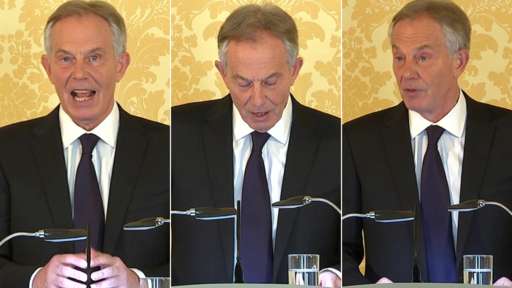
The Blair and Bush memos
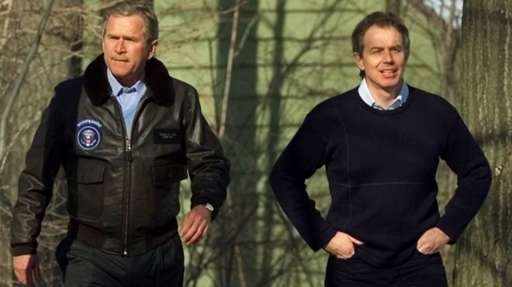
Memos sent by former UK prime minister Tony Blair to then US President George W Bush in the run-up to the Iraq War shine a light on the extent of the relationship between the two leaders.
The memos sent between 2001 and 2007 were released alongside Sir John Chilcot’s report of his inquiry into the Iraq War.
BBC
 Q FM Africa's Modern Radio
Q FM Africa's Modern Radio
